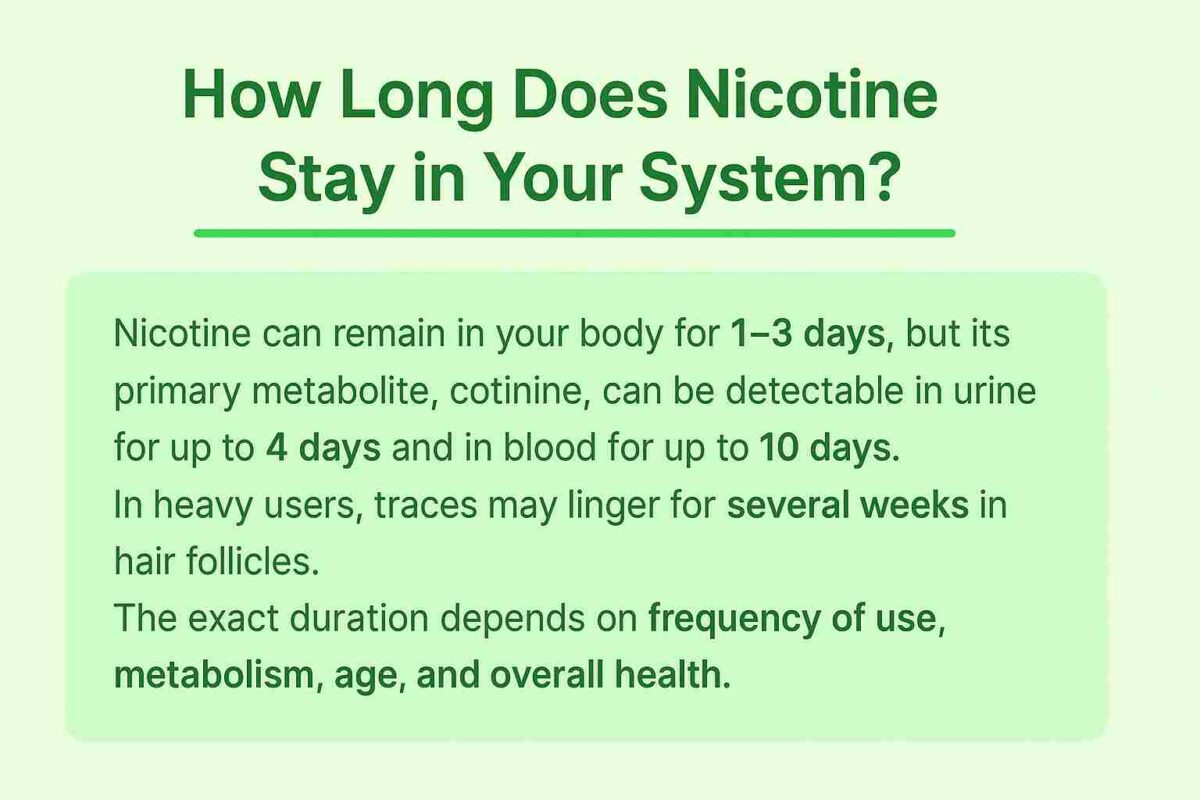Let’s be real — there are few things as stubborn as two things: nicotine hanging around in your body longer than you want it to, and tooth pain that shows up at the worst possible moment.
If you’ve ever found yourself wondering “How long does nicotine stay in your system?” while also Googling desperate things like “kill tooth pain nerve in 3 seconds permanently”, you’re not alone.
We’re gonna dive into both — because life isn’t neat and tidy, and sometimes your coffee break turns into a rabbit hole of health questions.
Why People Ask About Nicotine & Tooth Pain Together
Picture this: You’re trying to quit smoking, you’re stressed, and now your tooth starts hurting like it’s auditioning for a horror movie. Suddenly, you’re thinking about your nicotine cravings and ways to end this tooth agony in record time.
Nicotine and dental pain are actually more connected than you might think. Smoking can contribute to gum disease, slow healing, and even make tooth pain worse. And if you’re quitting? Your body is detoxing while you’re trying to manage pain. Not a great combo.
First Things First: How Long Does Nicotine Stay in Your System?
Nicotine doesn’t just disappear when you stub out your last cigarette. It hangs around, and your body has to work to break it down.
Here’s the short version: Nicotine itself can be gone in a day or so, but its byproducts — especially cotinine — can be detected for much longer.
The Quick Timeline
-
Nicotine in blood: Usually gone in 1–3 days
-
Cotinine in blood: Detectable for up to 10 days
-
Cotinine in urine: Around 3–10 days, longer for heavy smokers
-
In hair: Up to 3 months (sometimes longer)
So yeah, if you’ve got a test coming up, those “quit the day before” plans don’t usually work.
Why It Sticks Around
Nicotine is fat-soluble, meaning it likes to hang out in your body’s fat cells for a while. And if your liver is busy with other things (like breaking down alcohol, meds, or even high-fat foods), the process can be slower.
My First Attempt at Quitting
The first time I quit, I thought I’d be “clean” in 48 hours. Nope. My sleep was off, my cravings were through the roof, and that little strip test still showed positive. I felt like I’d been tricked — but really, I’d just underestimated how sneaky nicotine is.
How to Speed Up Nicotine Elimination (Without Doing Anything Weird)
You can’t magically flush nicotine in 3 seconds — your liver and kidneys have their own schedule — but you can help them along:
-
Stay hydrated – Water helps flush metabolites through urine faster.
-
Eat antioxidant-rich foods – Think berries, spinach, citrus — they support detox pathways.
-
Get moving – Exercise boosts circulation and metabolism.
-
Limit caffeine – Nicotine withdrawal already messes with sleep, and caffeine can make it worse.
-
Sleep well – Your body detoxes best during deep sleep cycles.
Now, About That “Kill Tooth Pain Nerve in 3 Seconds Permanently” Thing…
Here’s the honest truth: You can’t really permanently kill a tooth nerve yourself in 3 seconds at home — not without doing something unsafe.
That’s a job for a dentist, usually through a root canal or extraction. Those are the legit ways to kill the nerve for good.
Why People Search for This
-
Tooth pain often hits at night or on weekends when your dentist isn’t available.
-
It can be so intense that you’re ready to try anything.
-
Old-school remedies and urban legends promise “instant nerve killing” — but most are risky or just don’t work.
What You Can Do in Seconds to Calm Tooth Pain
These aren’t permanent fixes, but they can give you fast relief until you can see a dentist:
-
Cold compress – Numbs the area and reduces swelling.
-
Clove oil – Natural anesthetic, dabbed directly on the tooth/gum (strong taste though).
-
Saltwater rinse – Cleans the area and soothes inflammation.
-
Over-the-counter pain meds – Ibuprofen or acetaminophen can help dull the pain.
A Tooth Pain Story That Still Makes Me Cringe
One time, I ignored a dull ache in my molar for weeks. Big mistake. By the time I went to the dentist, I needed a root canal. The dentist told me the nerve was so inflamed, no amount of painkillers would’ve fixed it for long.
So yeah, I get why “kill tooth pain nerve in 3 seconds permanently” is a tempting search — but trust me, the safe route is always better than the DIY nerve-kill attempts I’ve seen floating around the internet.
The Smoking-Tooth Pain Connection
Nicotine isn’t just messing with your heart and lungs — it can also make your mouth a playground for bacteria.
Smoking reduces blood flow to your gums, meaning slower healing, higher risk of infection, and a greater chance of that toothache turning into something serious.
If you’re quitting nicotine, you might notice your gums bleed more at first — it’s actually a sign your circulation is improving and inflammation is coming down.
What If You’re Trying to Quit While Dealing with Tooth Pain?
This is a tough spot, because pain is a trigger for many smokers. Here’s what helps:
-
Distraction techniques – Walk, watch something funny, call a friend.
-
Nicotine replacement therapy – Gum, patches, lozenges can ease cravings without smoking.
-
Healthy oral care – Gentle brushing, flossing, and using alcohol-free mouthwash.
-
Dental appointment ASAP – Don’t try to tough it out for weeks.
Long-Term Relief: For Both Nicotine & Tooth Pain
The best solution for nicotine? Quitting for good — yeah, I know, easier said than done.
The best solution for tooth pain? Professional dental treatment before things get worse.
Think of both like this: the longer you wait, the harder it is to fix. Early action = less pain, less cost, and less drama later on.
Check Out Related Insights
-
How to stop nicotine cravings naturally
-
The truth about home remedies for toothaches
-
Why quitting smoking is the best thing you can do for your mouth
FAQ
How long does nicotine stay in your system after one cigarette?
For most people, nicotine is gone in about 24 hours, but cotinine (its byproduct) can be detected for up to 3–4 days in blood or urine. If you’re a regular smoker, it can take longer.
Can you actually kill a tooth nerve at home?
Not safely. True nerve removal happens during dental treatments like root canals. Home methods may numb pain temporarily but won’t remove the nerve.
What’s the fastest way to stop tooth pain?
Cold compresses, clove oil, saltwater rinses, and over-the-counter pain meds can give quick relief, but they’re temporary fixes until you get to a dentist.
Does quitting smoking help with tooth pain?
Yes. Quitting improves gum health, blood flow, and healing speed, which can reduce dental pain in the long run.
Why do gums bleed more after quitting nicotine?
It’s usually a sign of improved blood flow. Nicotine constricts blood vessels, so when you quit, your gums get more circulation — but also more inflammation at first, which can cause bleeding.


Just tried 13win21. Had some decent fun. Could use a few tweaks, but overall it’s a pretty solid choice if you are bored. Definitely worth looking at: 13win21